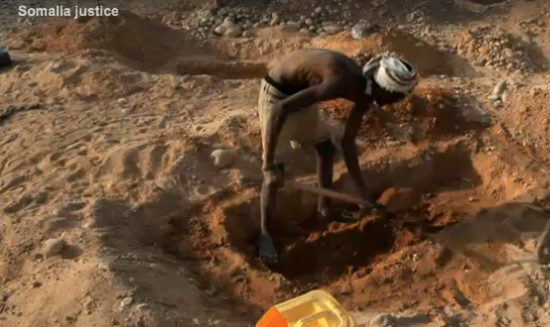VIDEO: Somali justice: forgiveness, money or execution
 Bossasso is in the semi-autonomous region of Puntland and has the largest prison in the area, where 400 criminals accused of the most serious crimes are locked up.
Bossasso is in the semi-autonomous region of Puntland and has the largest prison in the area, where 400 criminals accused of the most serious crimes are locked up.
Puntland has a functioning authority and is more stable than the Somali capital Mogadishu – the pirates who used to hang out in Bossasso have sailed south.
Every week Bosasso’s highest court deals with serious criminal cases such as murder, terrorism and piracy.
Murderers are judged according to Somalia’s sharia law and the concept of qisas, which means “equal retaliation”. It states that the murder victim’s family must decide the fate of the murderer.
“Once the sentence is passed, if the victim’s family choose to kill, then we take the defendant to the execution site, and the killing is carried out,” said Sheikh Adam Ahmed, the highest judge in Bossasso.
God’s will
The day I was in court, Ismail Sheik, a fisherman, was on trial accused of killing his wife and the mother of his six children. He arrived, sweating and nervous, a small, thin man. The children, aged from two to 16, watched impassively from behind as he faced the judge.
Defending himself, Ismail told the court: “My wife and I had an argument. I tried to restrain her and then some other people got involved. They pulled us apart. Then she started screaming … and then she collapsed. I didn’t hit her. I didn’t punch her. It was God’s will that she died.”
When your time is up, it’s up. We all have to die some day, whether you’re executed or die of natural causes. I’m waiting for my time.
Mohamed Sanbaare
Four witnesses, including his teenager daughter, testified on his behalf.
The verdict was good news for Ismail: “According to the police and the prosecutors, his wife died at God’s will,” the judge announced.
“Al-humdulillah, I’m happy,” Ismail said, picking up his youngest child and heading home.
Death file
Mohamed Sanbaare may not be so lucky. He is one of 67 death row prisoners at Bossasso jail. His case is in the prison’s “death file” marked in red.
A convicted murderer, he has been awaiting execution for nearly four years, watching as, one by one, his 20 cellmates were taken away, never to return.
“When executions are about to happen here, you can always tell,” he said.
“When your time is up, it’s up. We all have to die some day, whether you’re executed or die of natural causes. I’m waiting for my time.”
Mohamed knows if Qasim, the guard with the prison key comes in after the morning prayer, the waiting time is over.
Whenever Qasim takes one of the alleged criminals to the office, they expect the worst. He is the man the prisoners fear most.
Human trafficking
Mohamed once worked as a fisherman but he later joined the human trafficking industry because it is more profitable. Using his fishing boat, he would ferry immigrants across the sea to Yemen. Out at sea, he shot his friend Mohamoud dead. It was, he said, an accident, and then he refused to say more. His friend was 21.
The dead man’s father, Ali Faras, is a camel herder who once served in Somalia’s now defunct army. The fate of his son’s killer was in his hands.
“I have three options: to kill him, to pardon him or get blood money,” he said.
In Islamic law, blood money is very precise – one man’s life is worth the value of 100 camels. The current going price for 100 camels is about $20,000.
Mohamed’s mother, Asha, was left with the impossible task of finding the money in order to save her son from execution.
“$20,000! Where will I find $20,000 from?” she said.”If I can’t find the money, I will lose my son.”
Mohamed was the breadwinner of the family and Asha is now struggling to keep up with her rent. Facing eviction from her landlord was adding to her misery, but Ali Faras had been waiting for payment for four years, and was running out of patience.
“I am the victim and they promised to pay the blood money,” he told me.
“They say they’ll find it, and I told them: if you want to save your son, then pay.”
The tree of death
In Bossaso’s dusty cemetery, a small tree rises from the clusters of stones. People call it the tree of death. A gravedigger called Jerry – it’s a nickname, given to someone with a limp – explained that condemned men are blindfolded and tied to the tree.
The local authorities then provide the family of the victim with an AK47 and five bullets. The person chosen to carry out the deed stands five metres from the tree.
“Sometimes they miss because they’re shaking so much,” said Jerry.
The authorities will then provide an extra five bullets, and allow the marksman to stand just two metres from his target, and have another go.
“The victim’s family come here eager to finish the job,” said Jerry.
“But once they shoot the man dead, they always rush away. There’s a sense of guilt.”
Asked how he felt about seeing prisoners killed, he shrugged.
“I’m not bothered because they are just paying for the consequences of their actions,” he said. “We gravediggers don’t give a damn.”
___
Channel 4
Comments
comments
 Calendar
Calendar






































